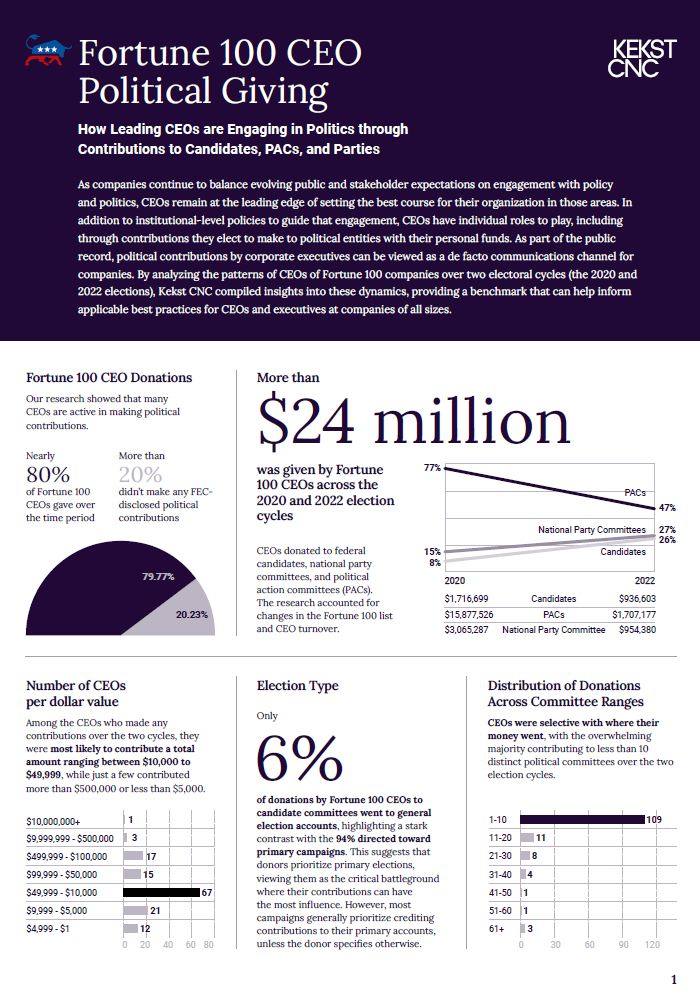As companies navigate evolving public and stakeholder expectations around political and policy engagement, CEOs are at the forefront of shaping the approaches of their organizations. Beyond setting institutional policies, CEOs play an individual role via their personal political contributions. As these donations are part of the public record, they can serve as a de facto communication channel for the company. Consequently, CEO contributions may be seen as reflecting the company’s stance on a political race, particularly in the absence of other overt company messaging.
Understanding CEO political giving trends is key to grasping how Corporate America engages in political and policymaking dynamics. We analyzed the contribution patterns of Fortune 100 CEOs over two electoral cycles (the 2020 and 2022 elections), offering insights that can help inform best practices for executives.
Our methodology
Kekst CNC examined Federal Election Commission (FEC) data on the political contributions of Fortune 100 CEOs between November 7, 2018, and November 8, 2022. During this period, these CEOs donated roughly $24 million to federal candidates, national party committees, and political action committees (PACs). The research accounted for changes in the Fortune 100 list and CEO turnover.
There are some notable limitations to this analysis. In today’s political landscape, many high-dollar donors contribute through "dark money" organizations that do not disclose the identities of their donors, limiting the scope of publicly available data. Additionally, one CEO’s $10 million PAC contribution skewed some averages and comparisons, presenting an outlier that significantly influenced the findings.
Our Findings
Our research revealed that most Fortune 100 CEOs contribute to political candidates: about 80% of them made FEC-reported donations during the 2020 and 2022 election cycles, with only about 20% abstaining from political giving that was disclosed to the FEC. Most contributions directed to candidate campaigns went to House or Senate races, with presidential campaigns receiving a smaller share. This is not unexpected, given that the data spans two congressional election cycles but only one presidential race, and during that time there were hundreds of congressional candidates but only a handful of major presidential campaigns.
That said, CEOs were selective about where their money went. The majority contributed to fewer than 10 distinct political committees across the two cycles. Primary campaigns received the bulk of contributions, with only 6% going to general election accounts (note: most campaigns prioritize crediting donations to their primary election accounts unless a donor specifies otherwise). Among contributing CEOs, most donated between $10,000 and $49,999 in total, while only a handful gave more than $500,000 or less than $5,000.
CEO Giving by Industry
When examined by industry, CEOs from the energy sector were the largest contributors. Executives from industries like aerospace and defense, delivery (FedEx/UPS), and health tended to donate more to Republicans. In contrast, CEOs from the entertainment and consumer/retail industries leaned toward Democrats. Insurance CEOs (excluding health insurers which are grouped under the health industry) gave more evenly across party lines, while CEOs in banking, food production, and technology were often party-neutral, preferring to donate to company PACs rather than individual candidates or parties.
Notably, many CEOs of consumer-facing brands—such as Coca-Cola, Microsoft, Apple, Pepsi, Walmart, and Costco—did not make FEC-reported contributions. This may reflect sensitivity to the potential reputational impact of their political donations. Among those consumer-facing executives who did contribute, they were more likely to support Democrats than Republicans.
Partisan Insights
In general, Fortune 100 CEOs preferred Republican-affiliated campaigns, with 85% of the total dollars donated during the two cycles going to Republican-affiliated candidates, PACs, and party committees. Only 7% of contributions went to Democratic-affiliated entities, while 8% were given to committees that backed candidates from both parties. CEOs contributing to Republicans tended to give primarily to PACs (59% of total Republican donations), while those supporting Democrats favored national party committees (50% of total Democratic dollars).
Conclusion and Best Practices
Navigating the choppy waters at the intersection of business and politics continues to be an outsized priority for C-suite leaders. CEOs, in particular, may find themselves in the spotlight because of their personal political donations, which may be perceived as reflecting company political preferences and policy stances, posing potential reputational risk. At the same time, the risks of a prominent CEO not contributing to candidates—such as to home state representatives, senior members of relevant congressional committees, and others with outsized influence in a company’s area of work—also need to be taken into account.
Balancing these equities is not a straightforward calculus. CEOs should consult with their communications, public affairs, and government relations teams when considering their political giving strategy.
Kekst CNC continues to monitor these trends, both as part of our work providing bespoke counsel to clients based on their unique circumstances, as well as benchmarking for best practices across the business community. Following the 2024 election cycle and the release of its accompanying FEC data in early 2025, Kekst CNC will release an update to this research to identify any new insights and highlight any shifts in patterns of CEO political giving.
Special thanks to Kekst CNC team members Ellie Taylor, Allie Worchell, Bay Dotson, and Olivia Kim, for their substantial and invaluable contributions to the research and insights included in this report.


